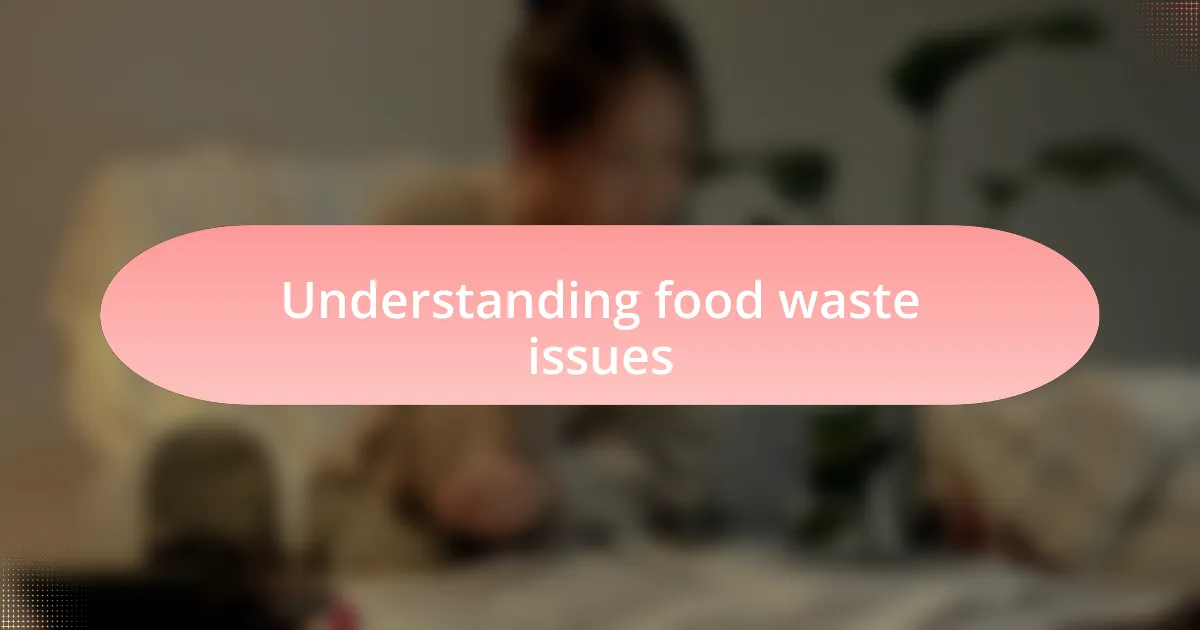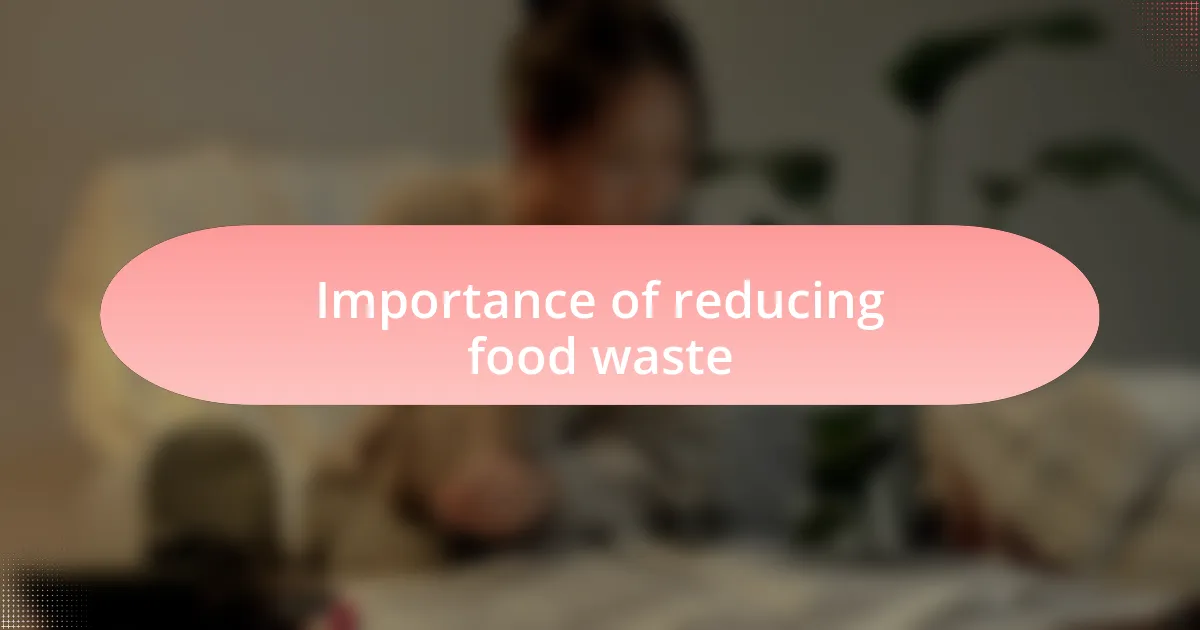Key takeaways:
- Food waste is driven by societal perceptions prioritizing aesthetics over nourishment, leading to significant waste even in food insecure regions like South Africa.
- Reducing food waste has substantial environmental and economic benefits, impacting landfills and contributing to resource conservation.
- Local initiatives in South Africa, like community gardens and educational campaigns, effectively engage the community in reducing food waste and enhancing knowledge.
- Practical strategies such as meal planning, embracing “ugly” produce, and proper food storage can significantly minimize waste and promote sustainability.

Understanding food waste issues
Food waste is a pressing issue that affects us all, yet many people don’t truly understand the scale of the problem. Reflecting on my experiences at community events, I remember the shocked faces of volunteers as we sorted through mountains of discarded fruits and vegetables that were perfectly edible but deemed unworthy by retailers. Why do we often prioritize aesthetics over nourishment? It’s a question that lingers, reminding us that our perceptions significantly influence our actions.
In South Africa, food waste is particularly tragic, as we grapple with high levels of food insecurity. I once spoke with a farmer who shared how he sees great portions of his harvest go to waste simply because they don’t meet certain visual standards. This disconnect between producers and consumers highlights a crucial aspect of food waste: it’s not just about what’s thrown away but about the societal values that dictate these choices.
Moreover, consider how much of our food ends up in landfills, where it decomposes and produces methane, a potent greenhouse gas. This realization hit me during a local workshop when we discussed sustainable practices. It made me wonder—if we could radically change our habits, what impact could we have? Understanding food waste issues isn’t just about recognizing statistics; it’s about connecting emotionally to the food we consume and the lives it can support.

Importance of reducing food waste
Reducing food waste is essential, as it directly impacts our environment and resource consumption. I recall a community initiative where we gathered information about the quantity of food thrown away weekly. The staggering numbers shocked everyone involved. Imagine how many meals could be created and lives uplifted if we made better use of what we already have. Isn’t it heart-wrenching to think about the potential nourishment lost daily?
Moreover, food waste carries significant economic implications. The financial burden of discarding food is not just a household issue; it touches farmers, retailers, and consumers alike. I once participated in a local conversation where business owners expressed frustration over unsold goods that went to waste. It felt poignant to realize that each discarded item represents a loss not just for their bottom line but for the efforts and resources that went into producing it. How often do we consider the broader chain of consequences tied to our food choices?
Lastly, reducing food waste is crucial for releasing pressures on landfills and minimizing greenhouse gas emissions. During a hike in a national park, I was struck by the beauty of preserved nature, yet the thought of food waste contributing to environmental issues lingered with me. Why should we allow something as preventable as food waste to worsen climate change? Recognizing this connection can inspire us to change our habits and cultivate a more sustainable world.

Local initiatives in South Africa
Local initiatives across South Africa are making significant strides in reducing food waste. For instance, I remember attending a community garden project in Johannesburg, where residents came together to cultivate edible produce from surplus food scraps. The sense of camaraderie as neighbors shared not just food but also knowledge was inspiring. Isn’t it amazing how collaboration can transform what was once seen as waste into a source of nourishment?
In Cape Town, the “Love Food Hate Waste” campaign educates individuals about smart shopping and proper storage techniques. I once joined one of their workshops, and I was surprised to learn just how much food I had been wasting without realizing it. Reflecting on that day, I couldn’t help but wonder: How many people are unknowingly contributing to food waste simply because they lack the right information?
Additionally, many local restaurants are participating in food rescue programs, donating excess meals to those in need. I vividly recall volunteering at a shelter where I witnessed the joy on people’s faces as they received these meals. It struck me then—every plate saved not only helps alleviate hunger but fosters a sense of community. Isn’t it heartwarming to think that a simple act of generosity can make such a profound impact?

Practical tips for everyday reductions
One practical tip I find incredibly effective is planning meals in advance. I remember the chaos of cooking without a plan, often leading to forgotten ingredients sitting in the fridge until they spoiled. Now, by mapping out my weekly menu, I not only minimize waste but also save time and money. Have you tried meal prepping? It transforms the way we think about food and helps ensure nothing goes uneaten.
Another simple but powerful approach is to embrace the “ugly” fruits and vegetables. During a recent grocery run, I opted for produce that others might overlook due to their appearance. Not only did these items taste just as good, but I also felt a sense of satisfaction knowing I was reducing the demand for perfectly shaped produce that often goes unsold. Isn’t it interesting how our choices can reflect our commitment to sustainable living?
Finally, understanding proper storage techniques can make a significant difference in prolonging the life of our food. I’ve made it a habit to research how to store various items, like keeping bananas away from other fruits to prevent premature ripening. I was amazed at how small adjustments made such a big impact. How much food could we save with a little extra knowledge? By sharing these insights with friends and family, we can create a ripple effect that encourages others to take action.

Community outreach and education
Community outreach plays a critical role in reducing food waste, as it fosters a sense of responsibility within neighborhoods. I once attended a local workshop that focused on food waste reduction strategies; it was eye-opening to learn about the staggering amounts of food discarded weekly in our community. When we shared our own experiences, it became evident how much power we had collectively to make change. Have you ever thought about the impact of simply talking to your neighbor about food waste?
Education initiatives in schools also create lasting change. I remember volunteering at a program that taught children the importance of using food scraps creatively. Seeing their faces light up as they transformed leftover veggies into delicious vegetable broth was a reminder of how instilling these values early can change future generations. Isn’t it encouraging to think that today’s children could become tomorrow’s leaders in sustainability?
Moreover, community gardens are fantastic avenues for outreach and education. Participating in one allowed me to witness firsthand the joy of harvesting vegetables while learning to appreciate the entire food cycle, from seed to table. Each harvest brought discussions about composting and food production, solidifying our commitment to reducing waste. How wonderful would it be if more neighborhoods embraced this concept and worked together to cultivate not just plants, but a shared understanding of sustainability?